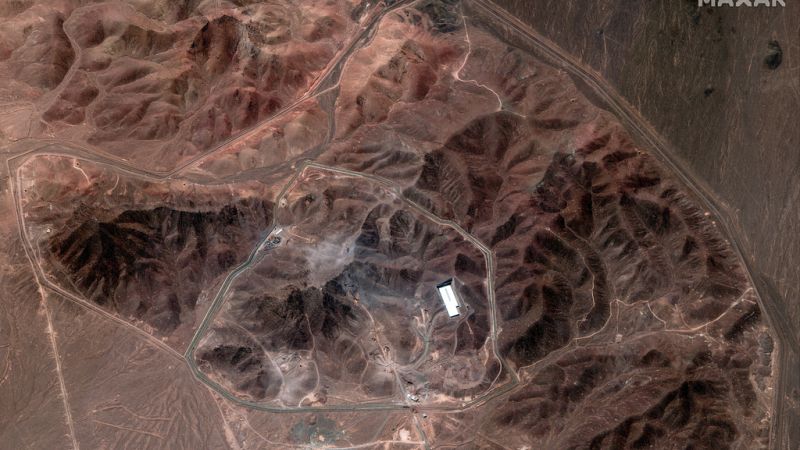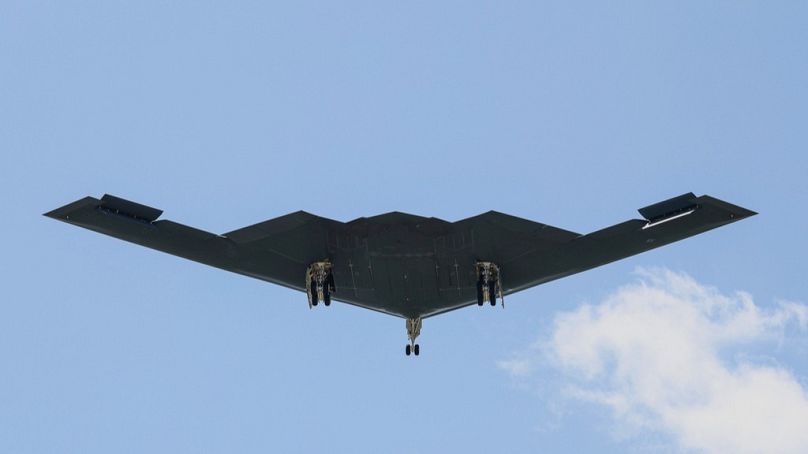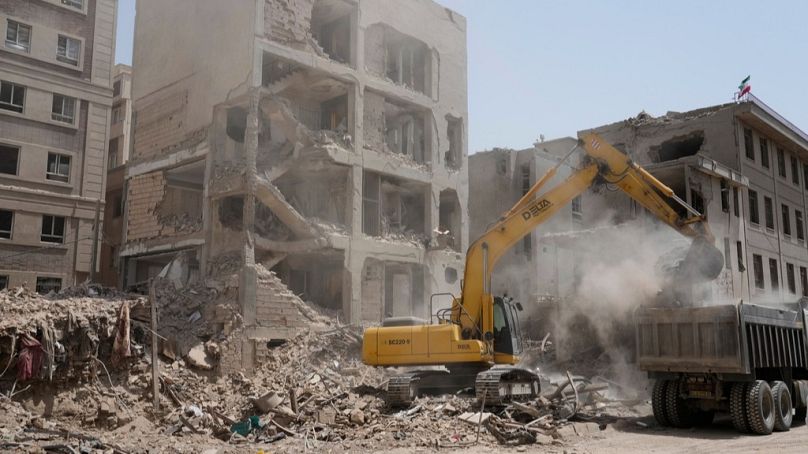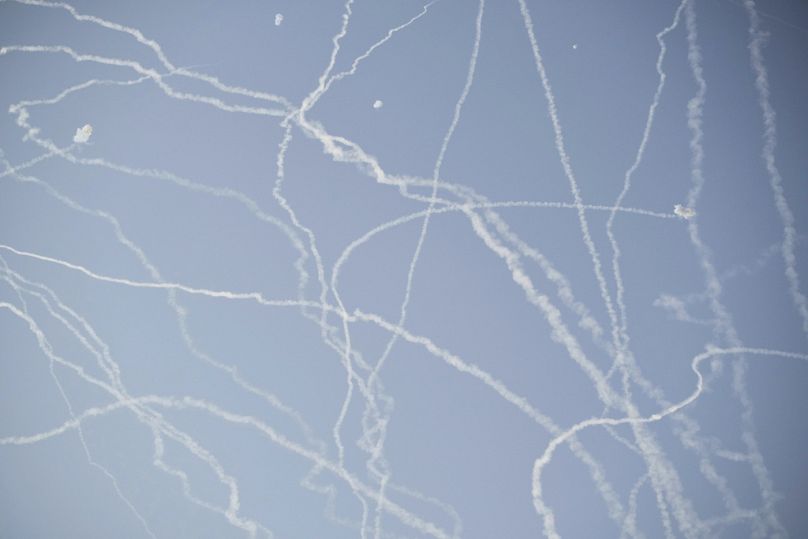
After the 12-day conflict between Israel and Iran, significant doubts remain about the durability of the truce and the prospects for a future Iranian nuclear deal.
It's been just over a week since the US pressed the two regional rivals into a ceasefire, ending an air war that started on 13 June when Israeli airstrikes wiped out the upper ranks of Iran’s powerful Revolutionary Guard and targeted its arsenal of ballistic missiles.
The strikes also hit Iran’s nuclear sites, which Israel claimed put Tehran within reach of a nuclear weapon. Iran hit back with barrages of missiles on Israeli military sites, infrastructure and cities.
A fragile peace was brokered by Washington on 24 June, a day after it bombed three of Iran’s key nuclear sites.
Yet the possibility of renewed US-Iran talks is up in the air. Washington and Tehran were holding discussions on Iran's nuclear programme when Israel started the war.
Speaking on Tuesday, Iranian Minister of Foreign Affairs Abbas Araghchi dismissed the prospect of swiftly resuming talks with the US, after President Donald Trump had suggested that negotiations with Tehran could resume as early as this week.
"The end of US military threats is a precondition for the resumption of talks between Tehran and Washington," Araghchi said in an interview with CBS.
Iran sidelines UN nuclear watchdog
Trump said last week that he would consider carrying out fresh strikes on Iran if the country was found to be enriching uranium to concerning levels.
Rafael Grossi, the head of the International Atomic Energy Agency (IAEA), the UN nuclear watchdog, said on Sunday that the US strikes on the three nuclear sites in Iran — Fordow, Natanz and Isfahan — had hugely hampered its capacity to enrich uranium.
However, he warned that Tehran could be producing enriched uranium "in a matter of months".
Iran's President Masoud Pezeshkian on Wednesday ordered the country to halt its cooperation with the IAEA, according to state media. The country's trust in the agency is now broken, Pezeshkian told French President Emmanuel Macron in a call on Sunday.
Satellite images dated 29 June that were released by US aerospace firm Maxar Technologies show activity at the Fordow site, one of Iran's main uranium enrichment centres, which was hit by the US B-2 bombers.

The images show diggers and people at work around the large vents of the underground site's ventilation systems.
Before the Iran-Israel conflict, IAEA was allowed regular access to Iran's enrichment sites to monitor them. But under the law passed on Wednesday, any future inspection of Iran's nuclear sites by the IAEA needs approval by the Supreme National Security Council.
"How do you think we can guarantee their (IAEA inspectors') safety when our peaceful facilities were targeted until a few days ago?" an Iranian diplomatic source told Euronews.
Agreement unlikely
While the conflict may have been considered brief by Israel and the US, for Tehran's leadership, the war remains essentially unresolved, despite the ceasefire.
Unsurprising, perhaps, given that Tehran has put the death toll of the war on its citizens at 935 — including 38 children and 132 women.
Israeli Prime Minister Benyamin Netanyahu has said there are 'ample regional opportunities' for stabilisation after the twelve-day conflict, but this remains to be seen.
According to Raffaele Marchetti, director of the Centre for International and Strategic Studies at Luiss University in Rome, Tehran's leadership is opposed to the ultimate strategic goal of Israel and the US, which is not only that of a denuclearised Iran.

While Netanyahu's has framed destroying Iran's nuclear programme as a matter of Israeli national security, Tehran's strategic objective would be a regional balance of power based on mutual nuclear deterrence, according to Marchetti.
"It is not at all surprising that Iran has embarked on a process of nuclear development, but here we have to be a bit careful about that because at least formally, Iran, unlike Israel, has always adhered to the nuclear non-proliferation treaty," Marchetti said.
It is therefore difficult for an agreement to be reached between the parties without one of them giving in, he told Euronews. Regime change could resolve the issue in the long run, Israeli and the US have calculated.
Iran fears Israel's regional hegemony
Israel, which has not officially recognised that it possesses nuclear weapons, does not adhere to the nuclear Non-Proliferation Treaty, unlike Iran, which did sign the agreement in 1970, during the rule of the Iranian Shah Mohammad Reza Pahalavi.
At the time, Tehran stood as one of three key pillars — alongside Israel and Turkey — in the pro-Western, anti-Soviet balance of power in what is now referred to as the "extended Middle East", which also includes the Caucasus and Central Asia.
In those years, before the Shia clerical revolution of 1979, Ankara, Tehran and Tel Aviv shared warm political and military relations, based on converging strategic interests.
However, today, Iran speaks of its desire to destroy Israel.
Neither Israel nor Iran have official military nuclear doctrines, because the former does not recognise that it has a nuclear arsenal, while the latter insists on pursuing a nuclear programme that is exclusively for peaceful, civilian purposes.
Israel neither admits nor denies having atomic weapons; it is the so-called doctrine of deliberate strategic ambiguity: a state that keeps potential adversaries in uncertainty about its reaction in the event of any conflict.
According to estimates by others countries, international organisations and members of the scientific community, Israel possesses a stockpile ranging between 90 and 400 nuclear warheads.
Although there is no official doctrine regarding the use of atomic force, in reality for Israel the nuclear weapon 'is the ultimate weapon", said David Rigoulet-Roze, a Middle East scholar at Iris, the Paris-based Institute of International and Strategic Relations.
"We are in total deterrence, it was not used even in 1973 (when Israel risked military collapse in the face of the Syrian and Egyptian offensive) in the Yom Kippur War", he said.

Pursuit of strategic ambiguity
This is why, despite the deliberate strategic ambiguity, one thing is certain, Rigoulet-Roze told Euronews.
"The Jewish state does not tolerate, up to the use of force, the existence of other nuclear powers in the region," he said.
In fact, in 1981, Israel attacked and destroyed Iraq's Osirak nuclear reactor, which was officially intended for civil use and had been developed with the help of France under its then President Valéry Giscard d'Estaing and Prime Minister Jaques Chirac.
Israeli security services justified the attack by saying that the reactor could potentially have been converted to plutonium production.
In 2007, Israeli jets also struck around Der ez-Zor in Syria, where, according to Mossad, the al-Assad regime was building a nuclear reactor with the assistance of North Korea.
Today, the balance of power and political-diplomatic relations have shifted in Israel's favour: Egypt and Jordan have recognised the Jewish state, Syria is no longer in a position to do any harm after the fall of al-Assad, and Lebanon certainly poses no existential threat. What's more, Saddam Hussein's Iraq is now but a vague memory.
However, the presence of an Iranian strategic nuclear force would break the balance of non-proliferation in a notoriously unstable region, analysts warn.
"Saudi Prince Bin Salman has said that in the case of an Iranian nuclear force, Saudi Arabia would also pursue the military atom, and then there would be a potential domino effect with Turkey and Egypt feeling compelled to equip themselves with atomic weapons," Rigoulet-Roze said.
"This is what was intended to be avoided with the Iran nuclear deal signed in 2015 by the EU, the UK, Germany, France, the US, China and Russia, and denounced by President Trump in 2018," he added.







